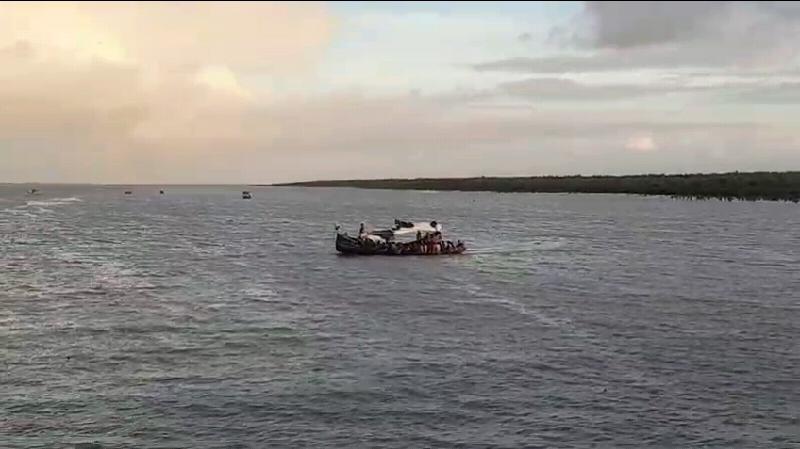Calling Bangladesh and International Communities for Urgent Intervention to Protect Rohingya Civilians in Maung Daw Downtown, Rakhine State, Myanmar August 9, 2024
By Mosha Rof, Cox’s Bazar, Chittagong, Bangladesh
The Conflict and Resilience Research Institute Canada (CRRIC) is calling on Bangladesh’s authorities and the international community to respond urgently to protect Rohingya civilians in Maung Daw Downtown, Rakhine State, Myanmar. The Institute strongly advocates for immediate intervention to safeguard Rohingya civilians in Maung Daw & Buthidaung, Rakhine State, Myanmar, from a deadly disaster that could have devastating consequences for the survival of the ethnic and religious minority group, the peace and coexistence of the entire Arakan region, the inclusive federal democracy of Myanmar, and the security and rehabilitation of the broader South and Southeast Asian region. Documented events occurred in Maung Daw from July 1st to 30th, during which the Arakan Army (AA) used drone attacks and heavy weapons, resulting in 29 deaths and over 64 injuries. Due to an internet shutdown and restricted movement, many casualties and injuries remain unreported. Additionally, the civil war between the Arakan Army (AA) and Myanmar Junta has resulted in the burning of some homes in Haiyanhali and ShewOn August 6, 2024, the Arakan Army (AA) and Myanmar Junta Government reportedly killed over 200 Rohingya civilians, including children, women, and men, and severely injured thousands more in Maungdaw township due to drone attacks, bombardment, and heavy artillery in recent days.
On August 5, the Arakan Army (AA) forcibly displaced civilians from downtown Maung Daw to flee the drone attacks in the region, but they still face entry denial at the Bangladesh. Thousands of Rohingya civilians find themselves stranded on the banks of the Naf River in Myanmar, desperately trying to flee the horrific attack, while the region continues to struggle with a shortage of humanitarian aid such as food, water, shelter, and medical care. the region. Prior to the August 6 attack, a surge of rapidly intensifying atrocities targeting Rohingya civilians had already taken place in Maungdaw Township. These atrocities include the AA’s mass arrests of Rohingya civilians, the occupation of Rohingya homes and villages, the looting of Rohingya properties, the forced removal of Rohingya civilians from their homes and villages, and the deployment of heavy weapons and additional drones.
In a heartbreaking development, the Naf River transforms into a graveyard for Rohingya civilians fleeing from Maung Daw, the border between Myanmar and Bangladesh. Tragically, the river is now overflowing with the blood and bodies of Rohingya genocide survivors, victims of brutal persecution and numerous other atrocities. atrocities. As violence escalates in Maung Daw, thousands of Rohingyas are desperately attempting to cross into Bangladesh to save their lives. However, Bangladesh’s restricted border policies and insufficient humanitarian response leave many stranded and vulnerable. A boat carrying Rohingya people from Myanmar capsized in the Bay of Bengal this morning, 7th August, 2024, washing at least 10 bodies ashore at a beach on the Teknaf side of Bangladesh. The victims include seven women, two men, and a child, said the local community. The incident occurred around 9:30 a.m. when the boat carrying Rohingyas fleeing Myanmar overturned at the bay near Habibchara area under the Sader Union of Taknaf due to rough sea, said Adnan Chowdhury, Upazila Nirbahi Officer. Some of the Rohingyas could swim ashore; locals have so far recovered 34 bodies, he added. Local communities, quoting those who survived the boat tragedy, reported that 29 Rohingyas were on board, sailing from Myanmar to escape the civil war in their region.
Lt Colonel Mohammed Mohiuddin, commanding officer of Teknaf BGB-2, said that he heard about the matter. The Rohingya Civilians in Maung Daw & Buthidaung, located in Rakhine State, Myanmar, are currently experiencing a second wave of genocide, described as “another genocide” and “worse than 2016 and 2017”. The atrocities that have been observed across northern Rakhine State for nearly eight months have reinforced this pattern. The applicability of such harrowing language to this context is noteworthy. In January 2024, AA members forcibly entered Hpon Nyo Leik village, Buthidaung Township. They positioned themselves in the Rohingya village, thereby inviting the Burmese military’s deadly assaults on its residents. In February, the Burmese military began forcibly recruiting the country’s civilians, including thousands of Rohingya and IDPs in Sittwe Township. In the subsequent months, while coercing Rohingya to launch divisive protests in the area, the Burmese military intensified its airstrikes on civilians, including in Rohingya villages, and, allegedly with its collaborating groups, attacked ethnic Rakhine-majority areas in Buthidaung Township. Such divisive conditions rapidly aggravated. In May, AA members set downtown Buthidaung on fire, destroyed the surrounding Rohingya villages, stole their belongings, drove out nearly 200,000 Rohingya residents, kidnapped Rohingya youth for coercive recruitment, and subjected hundreds of Rohingya civilians to torture and massacre. The Arkan Army (AA) has reportedly committed sexual and gender-based violence against Rohingya women. humanitarian catastrophe is also worsening in Rakhine State. The Rohingya civilians in the region are currently confronting significant challenges and other avoidable condition.
The few Rohingya who managed to reach Bangladesh now join the nearly one million Rohingya refugees as the country confronts an uncertain future, particularly for Rohingya civilians. Widespread internet and communication blackouts in Bangladesh have increasingly challenged all humanitarian actors, despite their sustained efforts to closely monitor, document, and verify the Rohingya’s situation. The years-long internet shutdown in Rakhine State, coupled with the escalating armed conflict, has effectively forced the majority of Rohingya in the region to rely on Bangladeshi mobile network operators for all forms of communication. Amid such a volatile context, relying on the Rohingya in Rakhine State to seek protection through precarious land and sea crossings is far from an effective and sustainable.
Such an avenue will only expose the Rohingya to dangerous conditions, further delaying their safe, voluntary, sustainable, and dignified return to their homes in Myanmar. These conditions include human trafficking, sexual and gender-based violence, child and forced marriage, forced labor and servitude, Islam-phobic and anti-Rohingya hate speech and disinformation, abductions and forced recruitment, arrest and detention, torture, mob attacks, and even death.
The ongoing lack of action in Myanmar has facilitated the deadly drone attack on Rohingya civilians on August 6 and the broader crisis in Rakhine State. Nearly seven years after the Myanmar military’s genocidal attacks, decades into its mass atrocities against ethnic and religious minorities, and over three years since its attempted coup. Therefore, the institute believes that these dire situations highlight the urgent need for international intervention and support to address the escalating humanitarian crisis and provide refuge to those in desperate need. We urgently need to deploy human rights observers and independent international investigations to the region to monitor and verify emerging developments. We must enable cross-border aid, including emergency humanitarian assistance and medical care, between the Myanmar-Bangladesh border, specifically to Maungdaw and Buthidaung townships, as well as other areas in Rakhine State where Rohingya civilians and IDPs reside. The world must act now to prevent further Rohingya deaths and ensure the protection of innocent civilians fleeing violence and atrocious persecutions in Myanmar.



